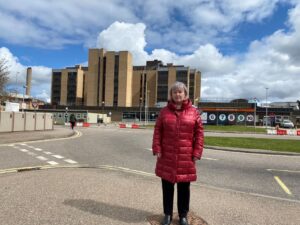
I am to meet with the Minister for Public Health, Jenny Minto, to discuss the ongoing concerns of constituents affected by chronic pain. I continue to press the Scottish Government on its attitude, and actions, towards Scotland’s 800,000 chronic pain sufferers, many of whom live within the NHS Highland board area.
This follows me having contacted the Scottish Government about the designation of a “no impact” pain category in a report which was funded by the Scottish Government.
In a letter replying to me in December last year, the Minister admitted that this categorisation was introduced into the report at the behest of Scottish Ministers. The letter states “This term was proposed by the Scottish Government as a contraction of ‘did not experience any limitation on life or work activities over the past three months” and that “participants did not use the term “no impact” themselves.” .. “Whilst you rightly indicate that comments from these participants indicate that they had experienced impact at some point from chronic pain, they had, at the time of recruitment, told the recruiters that they currently did not experience any impact.”
The people who were categorised as having “no impact” from their pain were all from Inverness which escalates the concerns that the Scottish Government is intentionally downgrading pain services in the Highlands.
Freedom of Information requests have revealed that participants were paid £200 to take part in the survey, which was advertised on Facebook. The Minister also advised me in her letter that “The screening questionnaire did not directly ask participants about whether their condition had been diagnosed by a health professional.”
Freedom of Information requests have uncovered shocking testament which backs up the long held views of many pain sufferers that the Scottish Government is trying to downplay the impact long term pain has on 800,000 people throughout Scotland. Research carried out on behalf of the Scottish Parliament’s Cross-Party Group on Chronic Pain has uncovered deception and minimisation of the effects that chronic pain has on people’s lives, both physically and mentally. I welcome reports in The Herald this week that has now brought this issue to the forefront of Scottish politics.”
Responding to The Herald’s articles and specific questions on chronic pain, a Scottish Government spokesperson said: “We remain committed to improving the quality of life and wellbeing for people with chronic pain. Meaningful and transparent engagement with people living with chronic pain is a priority part of the improvement work set out in our Pain Management Service Delivery Implementation Plan. While we engage regularly with cross-party groups, they are informal groupings of MSPs and other people and groups with an interest in a specific subject which are not part of the formal parliamentary structure for scrutinising Government.”
For the Scottish Government to ignore genuine pain patients and pay others to get the results they want is beyond reproach, but to insult the efficacy of the Parliament’s Cross-Party Groups adds insult to injury. People attend these groups in a bid to bring the issue to the attention of the people who can make the decisions to improve their quality of life.
The report highlighted can be accessed via the following link:- Scottish Government Pain Management Panel
